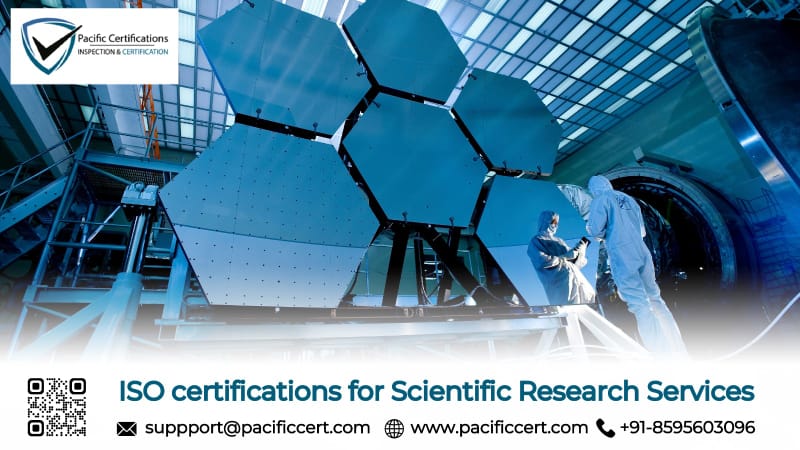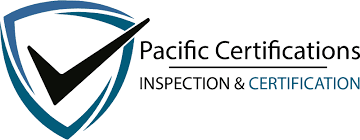ISO Certifications for Scientific Research Services, Requirements and Benefits

Introduction
Scientific research services operate within highly regulated environments where contract research organizations, testing laboratories, pharmaceutical research facilities, and academic research institutions must manage complex experimental protocols, control biosafety risks, and maintain stringent data integrity standards. Businesses face operational challenges including chemical hazards with 9.3% of laboratory chemicals classified at very high health risk levels, biological exposure risks, data integrity failures contributing to nearly half of FDA nonclinical inspection citations, and maintaining competence across diverse testing methodologies. Regulatory scrutiny intensifies as agencies enforce Good Laboratory Practice and Good Manufacturing Practice standards while demanding complete auditable documentation from method development through study archival.
ISO certifications provide scientific research organizations with systematic frameworks to standardize research protocols, implement biosafety management systems, ensure data integrity, and demonstrate technical competence. Pharmaceutical companies and regulatory authorities increasingly require documented quality management systems as prerequisite qualifications, while funding agencies evaluate ISO certification as indicators of operational reliability and research credibility.
In scientific research, credibility is earned through discipline, not discovery alone.
Quick Summary
ISO certifications provide scientific research services with internationally recognized frameworks to manage quality through ISO 9001, laboratory competence through ISO/IEC 17025, market research through ISO 20252, biosafety through ISO 45001, information security through ISO 27001, and environmental responsibility through ISO 14001. These standards address the research industry's critical requirements for data integrity, technical competence, regulatory compliance, and occupational safety while supporting acceptance of research findings by scientific communities and regulatory bodies.
For more information on how we can assist your scientific research business with ISO certifications, contact us at [email protected].
Applicable ISO Standards for Scientific Research Services
Below are the most relevant ISO standards applicable to contract research organizations, testing laboratories, pharmaceutical research facilities, and academic research institutions:
ISO 9001:2015 - Quality Management Systems
ISO 9001 standard enables research organizations to establish documented procedures controlling research planning, experimental design, data collection protocols, analysis methodologies, and reporting processes ensuring consistent quality and regulatory compliance. Implementation addresses common quality failures including protocol deviations, inadequate documentation, insufficient training, and failure to follow procedures that trigger regulatory observations and compromise research validity.
ISO 17025:2017 - General requirements for the competence of testing and calibration laboratories
This specialized standard establishes requirements for technical competence of testing laboratories conducting analytical measurements, method validation procedures, measurement traceability, equipment calibration, and quality control programs that ensure accurate and reliable test results. Implementation demonstrates laboratory capability to produce valid results supporting regulatory submissions, scientific publications, and commercial decisions while satisfying accreditation requirements.
ISO 14001:2015 - Environmental Management Systems
Research operations generate hazardous waste including chemical solvents, biological waste containing infectious materials, radioactive materials, sharps requiring special disposal, and emissions from fume hoods requiring environmental controls. This standard helps research facilities implement documented controls for waste segregation, chemical disposal, emissions monitoring, and environmental compliance that protect communities and satisfy regulatory permits.
ISO 45001:2018 - Occupational Health and Safety Management Systems
Research laboratory operations involve significant hazards including chemical exposures with cyclohexane and formaldehyde rated as very high risk, biological hazards from pathogenic organisms, physical hazards from radiation and lasers, sharps injuries during procedures, and ergonomic risks from repetitive laboratory work. This standard establishes frameworks for hazard identification, chemical risk assessment, personal protective equipment protocols, biological containment controls, and incident management protecting research personnel from occupational exposures.
ISO 20252:2019 – Market, Opinion and Social ISO 20252:2019 – Market, Opinion and Social Research
This standard specifically addresses market research organizations and social science research, establishing requirements for project management, ethical data collection practices, transparent reporting, and quality assurance throughout research projects. Implementation ensures market research maintains methodological rigor, respondent confidentiality, and objective reporting standards that enhance credibility with clients and regulatory bodies.
ISO 27001:2022 - Information Security Management Systems
Scientific research organizations handle highly sensitive data including proprietary research findings, clinical trial records, intellectual property, confidential sponsor information, and subject data requiring protection against cyber threats and unauthorized access. This standard provides comprehensive frameworks for access controls, data encryption, secure data storage, incident detection, and regulatory compliance with data protection legislation safeguarding research integrity and competitive advantage
Click here to find out more applicable standards to your industry
What are the requirements of ISO Certifications for Scientific Research Services?
Scientific research service providers seeking ISO certification must establish and maintain documented policies, procedures, and records aligned with the selected ISO standards. Key requirements include the following.
ISO 9001:2015 – Quality Management Systems Requirements
Define quality objectives for research accuracy, protocol compliance, data integrity, client satisfaction, and regulatory conformance with measurable targets
Implement documented procedures for research planning, experimental protocols, data collection, analysis methods, and reporting standards
Establish change control procedures for protocol modifications, equipment changes, and method revisions with impact assessments and approvals
Maintain comprehensive records of study protocols, raw data, analysis results, deviations, investigations, and corrective actions
Conduct internal audits and management reviews analyzing performance metrics, regulatory compliance, and continuous improvement effectiveness
ISO/IEC 17025:2017 – Testing and Calibration Laboratories Requirements
Demonstrate technical competence of laboratory personnel through qualification records, training documentation, and competency assessments
Establish measurement traceability linking test equipment calibration to national or international standards through certified reference materials
Implement method validation procedures demonstrating accuracy, precision, sensitivity, specificity, and reliability of testing methods
Maintain quality control programs including reference standards, duplicate testing, proficiency testing, and interlaboratory comparisons
Document measurement uncertainty calculations for all reported test results ensuring appropriate interpretation
Authorize personnel for specific laboratory activities based on demonstrated competence levels from basic to expert proficiency
ISO 45001:2018 – Occupational Health and Safety Requirements
Conduct comprehensive hazard assessments identifying chemical exposures, biological hazards, physical risks, ergonomic concerns, and equipment dangers
Implement chemical risk assessment protocols evaluating health hazards, environmental impacts, and safety risks for all laboratory chemicals
Establish personal protective equipment requirements including gloves, lab coats, eye protection, respiratory protection, and specialized gear
Define protocols for chemical handling, biological containment, radiation safety, sharps management, and emergency response procedures
Provide safety training addressing specific hazards, standard operating procedures, emergency protocols, and incident reporting
Engage laboratory personnel in hazard identification and safety control development through regular safety meetings and consultation
ISO/IEC 27001:2022 – Information Security Management Requirements
Implement access controls restricting research data, clinical trial information, and intellectual property to authorized personnel
Establish data encryption for electronic storage and transmission protecting confidentiality during collaboration and data sharing
Define data integrity controls ensuring complete, auditable documentation with tamper-proof mechanisms and traceability
Conduct security audits and vulnerability assessments identifying information security risks in laboratory information management systems
Implement blockchain technology or validated electronic systems providing transparent mechanisms for recording and verifying data transactions
ISO 14001:2015 – Environmental Management Systems Requirements
Identify environmental aspects including chemical waste generation, biological waste disposal, radioactive materials, solvent emissions, and energy consumption
Establish environmental objectives with measurable targets for waste reduction, emissions control, sustainable procurement, and resource efficiency
Implement controls for hazardous waste segregation, chemical disposal procedures, autoclave sterilization, and fume hood emissions
Monitor environmental performance through tracking waste volumes, emission levels, and regulatory permit compliance
Tip:Start by mapping your existing research workflows, data management practices, laboratory controls, and compliance procedures against the ISO requirements to identify gaps early and keep documentation aligned with real operations.
For more information on how we can assist your scientific research business with ISO certifications, contact us at [email protected].
What are the benefits of ISO Certifications for Scientific Research Services?
ISO certifications are suitable for research laboratories, contract research organizations (CROs), academic research centers, testing facilities, and scientific consultancy firms. Key benefits include:
Improved research credibility and institutional trust by demonstrating adherence to internationally recognized quality and governance standards.
Stronger control over research processes and documentation, supporting consistency, traceability, and reproducibility of research outputs.
Enhanced protection of research data and intellectual property, reducing the risk of data loss, misuse, or unauthorized access.
Better compliance with funding, regulatory, and ethical requirements, particularly for government-funded and regulated research projects.
Improved laboratory safety and working conditions, reducing incidents and supporting researcher well-being.
Greater readiness for audits, collaborations, and international partnerships, especially in multi-institution research environments.
The global scientific research and development services market projects growth to USD 1.38 trillion by 2029 at a compound annual growth rate of 10.2%, driven by renewable energy research, space exploration initiatives, pandemic preparedness programs, human genetics advances, and smart cities development. Artificial intelligence integration in research methodologies, global collaboration through distributed research networks, innovations in materials science and nanotechnology, and data science integration represent major trends reshaping research operations.
Industry outlook indicates continued expansion of contract research organizations supporting pharmaceutical development particularly for monoclonal antibodies and cell therapies with over 1,000 active studies currently recruiting, intensifying regulatory scrutiny on data integrity and GLP compliance requiring robust quality systems, adoption of advanced laboratory automation reducing human error while increasing productivity, and growing emphasis on interdisciplinary research requiring integrated quality management across multiple domains. Primary growth drivers include accelerating drug development pipelines requiring specialized research services, increasing government funding for climate change and renewable energy research, expanding precision medicine initiatives generating genetic testing demand, and technology adoption in emerging markets creating new research capacity.
How Pacific Certifications Can Help?
Pacific Certifications, accredited by ABIS, acts as an independent certification body for scientific research service providers by conducting impartial audits against applicable ISO standards. Our role is to objectively assess whether documented management systems and operational practices conform to international ISO requirements, based strictly on evidence and records.
We support scientific research organizations through:
Independent certification audits conducted in accordance with ISO/IEC 17021
Practical assessment of real research workflows, data controls, and laboratory governance
Clear audit reporting reflecting conformity status and certification decisions
Internationally recognized ISO certification upon successful compliance
Surveillance and recertification audits to maintain certification validity
Contact us
If you need support with ISO certification for your scientific research services, contact us at [email protected] or +91-8595603096.
Author: Ashish
Read more: Pacific Blogs

